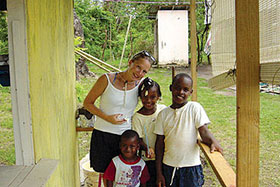2006 QEP: Focus
Beyond Boundaries:
Preparing Students to Become Global Citizens
Executive Summary
RATIONALE. Our graduates live, learn, and work as citizens of the world. Advancing communications and transportation technologies and global initiatives in business, politics, economics, arts, and sciences render geographic boundaries almost irrelevant. At the same time, failure to transcend cultural barriers creates misperceptions and tensions among peoples and nations. Institutions of higher education must develop deeper and more comprehensive opportunities for students to gain the necessary knowledge, attitudes, and skills to act as effective global citizens.

Learning strategies common to both liberal arts and international education expose students to a wide range of sometimes contradictory ideas and values and encourage critical thinking. Since the early 1970s, Wake Forest University (WFU) has extended its mission as a premier liberal arts institution to include a long-term commitment to international education. Currently, almost half of all our undergraduates study abroad. In recent years, the Institute of International Education has ranked Wake Forest consistently in the top tier among doctorate-granting institutions in the percentage of the undergraduate population that studies abroad. In planning initiatives for the last decade, Wake Forest has made internationalization a recurring priority. The proposed Quality Enhancement Plan (QEP) builds on those initiatives and provides an important impetus toward deepening and widening internationalization efforts at WFU. International education is a lasting and crucial element of our liberal arts education.
GOALS AND INITIATIVES. The ultimate goal of this QEP is to prepare Wake Forest students to become effective global citizens by offering every undergraduate student the opportunity to have a meaningful international experience. To reach this goal, the plan is divided into two major, interrelated initiatives. Initiative 1 aims to enhance the quality of our international programs; Initiative 2 aims to expand their breadth.
Initiative 1 addresses the quality of international programs; its central aim is to develop intercultural competency; that is, skills that allow students to study, live, and work effectively in cultures other than their own. A new program with the goal of maximizing the benefits of international experiences for students will encompass pre-departure preparatory sessions, activities while abroad, and reflection exercises upon return. Each component is designed to improve intercultural interactions and outcomes. Faculty leading international programs will receive guidance in developing activities and materials that will reinforce the concepts of intercultural competency. Peer advising programs will enable students who have had international experience to work with students who will be going abroad. More international students studying on campus, primarily through expanded exchange programs, will reinforce the exposure to different points of view and lead to a campus environment that encourages students to think about the world more broadly. We will strengthen our international curricular offerings by providing stipends and travel funds to faculty to develop new courses and programs with an international perspective and initiate efforts to bring more visiting international scholars to campus. Finally, we will improve oversight and assessment of our international programs to ensure high quality and continuous enhancement.

Initiative 2 will expand the number and types of international opportunities available to our students. International experiences represent the most important opportunity for students to make progress toward intercultural competency. While almost half of our graduates have had at least one international experience, many of our other students have difficulty fitting a study abroad program into their schedule due to curricular requirements, extracurricular commitments, financial concerns, or inadequate planning. To provide all students with more diverse opportunities and to target groups that have traditionally been underrepresented, Initiative 2 includes semester-long study abroad programs in new locations, more summer programs, and program options to fulfill major and divisional course requirements. International opportunities beyond traditional study abroad programs, including internships, research, service-learning and volunteer service opportunities, will be expanded. We will ensure that all students are apprised of international opportunities and advised on how to integrate them into their academic programs from their arrival on campus. Although we want to encourage as many students as possible to take part in education abroad, our goal is to increase the number of undergraduates who will have an international experience by 15 percent over current levels by 2010-2011.
ASSESSMENT. The components of the assessment plan focus on how program enhancements and new programs and activities improve student learning. We are particularly interested in attitudinal and behavioral changes that accompany enhanced intercultural competency. We will expand existing firstyear, senior, and alumni survey instruments, which assess student perceptions of their experiences, as well as program-specific evaluations to include additional questions aimed at gauging the impact of international experiences. As part of the QEP, we will measure the effects of study abroad experience on students’ intercultural awareness and competencies before and after their international sojourn using additional assessment instruments designed to measure these skills. In subsequent years, we will assess to what extent our new intercultural training and other program improvements have improved student understanding of different cultures. We will consider types of international experience and whether they achieve similar learning benefits. These assessments will also correlate students’ academic background and demographics with outcomes to understand whether certain programs yield greater gains for students with particular majors. Thus, the assessment will be an important tool to link program improvements to student learning. Our findings are expected to contribute to a better understanding of effectiveness of program types, which should be of interest to international educators beyond Wake Forest University.

IMPLEMENTATION. We recognize that such a comprehensive QEP requires institutional commitment and resources. To assure that these plans are implemented efficiently and with community support, the administrative structure for international education will be modified to include the creation of a new Associate Provost for International Affairs and new responsibilities for the Center for International Studies, including an additional staff position. The financial resources to support our QEP initiatives will be available through reallocation of current budget lines, additional revenue generated by international programs, and limited new external funding.
Wake Forest is confident that the efforts in this QEP will equip more of our graduates with a significantly improved understanding and appreciation of other cultures and the skills and ideas to thrive in and to contribute to the global environment. In short, our initiatives aim to encourage, prepare, and facilitate our students becoming global citizens.

